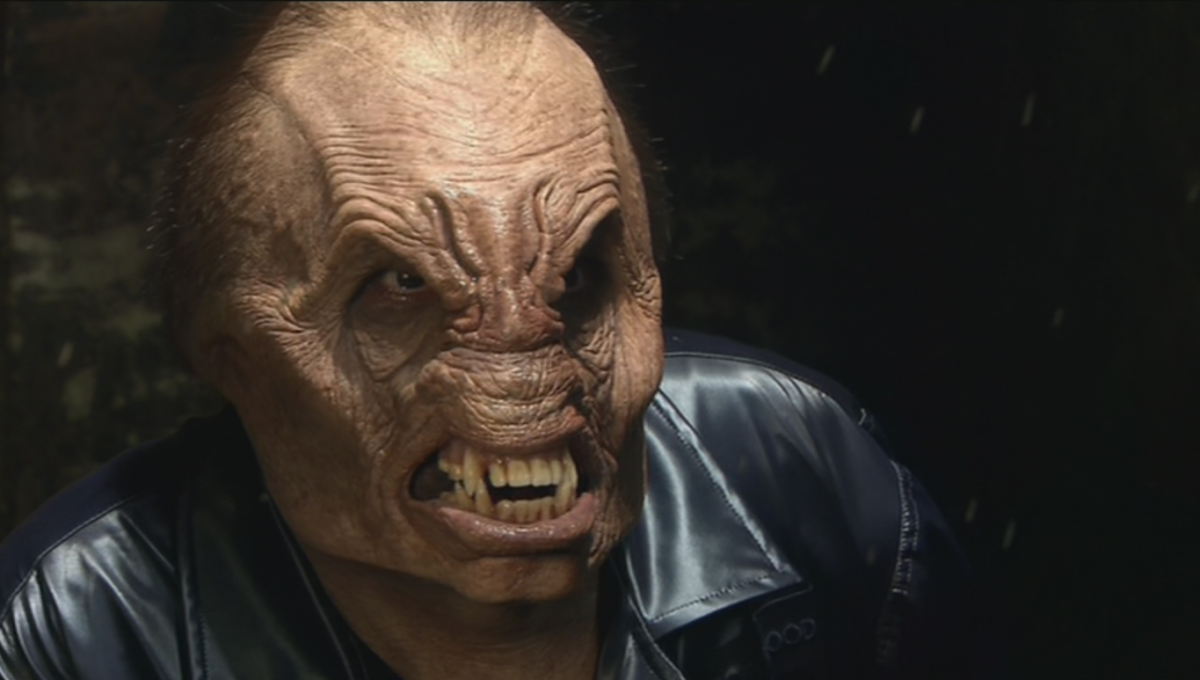There are plenty of traumatised characters in Doctor Who and its various spin-offs, and probably none more so than the Doctor themself.
A level of emotional vulnerability, and empathy for others, in addition to some horrific events, is needed to make any character’s pain stand out in a way that the audience feels it to. Often acting, and in a visual setting, plays a key role in this as you can see someone’s sadness in their eyes. But you can also hear emotional reactions in people’s voices, and not just reactions to what is happening to them now, but in the past. Some people carry their trauma into every sentence they say, even if they don’t want their fragility and fears to be a burden to others — in which case the most traumatised character of them all is Ianto Jones.
Earlier this year, Big Finish used its Torchwood monthly range to tell a trilogy of stories which highlighted that; given Ianto is such an empathetic man, his accumulation of trauma and sorrow over the years has not just been through big, violent events and sudden loss, but also smaller situations and settings that leave an ongoing mark. And who better to give the responsibility of sharing those stories than Gareth David-Lloyd, the man who has been portraying Ianto for 18 years.
The first story in this trilogy, Tube Strike, is probably the least focused on this element of Ianto’s character as it sends him Weevil-hunting in the tunnels of the London Underground during his very early Torchwood One years and where he’s still learning what it takes to be a Torchwood operative. He’s accompanied by his colleague Tommy Pierce, a regular from Big Finish’s Torchwood One range who audiences do not need to be familiar with to get stuck into this tale.
Rather neatly, the particular stretch of the Jubilee line that I commute via is the setting, so I naturally put on Tube Strike while on the way to and from work. Apologies fellow commuters.
The instantly recognisable soundscape of the trains themselves makes this story immersive at first, then it focuses tightly on its core cast and relies on the performances to carry it through.
David-Lloyd gives plenty of time to Tommy, Bill (Derek Elroy), and Tia (Kay Bridgeman) while Ianto takes a back seat and gets to witness the trauma levels ramp up.
The violent nature of interactions with the Weevils (which are accused of, like Ianto, being unwanted arrivals from Wales) provides plenty of graphic moments that he has to watch while keeping his head, and train driver Tia gets it so rough that she even gets an in-story congratulations for making it to the end in physically not-quite-one piece.
Meanwhile, there are the remarks from Tommy, the kind that can immediately hurt from bullies but when from colleagues and friends may not make a noticeable mark until observed in retrospect. There’s plenty in this that likely contributes to Ianto staying in the closet, even though David-Lloyd writes a knowingness into both Ianto and Tommy about why such remarks are being made and that they can be ignored because a strong friendship does exist underneath. Regardless, having a colleague repeatedly make you feel ashamed about any aspect of yourself is going to leave a mark.

The fact that Bill and Tommy are old friends, with a strong emotional connection, adds that extra element of whether Tommy’s own sensitivity – and therefore hypocrisy – should make him unlikeable. But gradually the layers do get peeled back and seeing his and Bill’s vulnerabilities makes for good character scenes.
Tia’s vulnerability manifests in physical form in the story, and what she uses to cope with that and mental struggles makes her witty and humorous and a bit mental. One of those characters who merits a return where the audience gets to encounter her in a totally different light.
Since the empathy in Tube Strike doesn’t have much room to exist beyond saying sorry to people eaten by Weevils, it’s up to the next two stories to show how caring and sensitive a character Ianto is.
Missing Molly perfectly fits Torchwood‘s early television tone, while also existing as a great piece of drama on its own. The thriller drama 13 featuring Jodie Comer came to mind when listening to this, since it explores why a parent with a missing child may wish with all their might for them to return but when they do it causes further unexpected pain and uncertainty.
The setting of Missing Molly is somewhat irrelevant, only because it’s a character study. Ianto and Torchwood’s place in it means the story, of course, takes place in Wales, but the listener could pick any town setting that’s familiar from their childhood.
The pre-titles scene is very impactful, and supplemented by a strong soundtrack, and Nia Roberts’ performance immediately sucks you in to the life of Alison. She is the mother of Molly, who once went missing at a fayre and has now inexplicably returned 12 years later with no memory beyond her disappearance.
Alison is simultaneously very caring and soft while also authoritative and willing to lead the way (with her assertion that Torchwood isn’t a very secret organisation levelling her up with Ianto), and is very composed with many of her interactions — particularly around her daughter — while also completely broken. Basically, she’s a very richly written character brought to life by some great casting and acting.
Having a ‘child’ be one of the main characters works, with limited dialogue but acted so the focus is on the tone rather than the content. Sometimes, Molly’s child-like reactions are sweet; other times, it’s a bit uncanny valley and that shakes the warmth and keeps the listener guessing about Molly and the story’s direction.
David-Lloyd also has to do a lot of acting as Ianto against Gwyneth Keyworth’s Molly, and he pulls it off. One highlight is Molly’s very observant (and child-like) description of Ianto as a person.

The other main character is Molly’s father, Stuart, who let her disappearance break him in a very different way to how Alison handled it. He’s portrayed to be potentially violent, but then David-Lloyd inserts a twist into the script before letting Stuart truly unload his anger.
It’s clear what the climax will be as the story develops, but as a character study, that’s fine. The listener is along for the ride, and one lines up how this story serves the ‘adults in the room’: “Even if you’re right, look at me, then look at you.”
Molly may well be an adult if there’s no timey-wimey trickery at play, but Alison and Ianto try to emotionally shield her as they would a child.
Another twist, but possibly one foreshadowed from the off, means the climax takes place away from the domestic setting and actually gives enough answers for it to be potentially unsatisfactory. Missing Molly deserved to end on more of a mystery, and providing a conclusion instead actually works against it as a one-off piece of drama. Particularly if you shared this with a non-Torchwood fan.
However, if you view it through the lense of an experience in Ianto’s life which was part of his personal development and explains his empathy, then a conclusion is definitely what’s needed. Had there not been one, meeting Molly may have ended up being a more profound and long-lasting experience rather than just another remarkable job that you have to complete as a Torchwood operative.
The trilogy gradually gets closer to Ianto, and Disco goes as close as you possibly can in a story without romance or sex (actually, there is sex in this one, but not between the main characters thankfully).
Big Finish’s own summary of the story is a great starting point to explain this one, and why director Lisa Bowerman loves it:
It’s 1987 and “Disco” Jones is still dancing. Life and soul, bab, life and soul. Wednesdays is darts at The Merry Miller, Thursdays – shove ha’penny at The Boilermakers, Fridays played by ear, and Saturdays it’s the Disco at Cinderella’s.
So who is Tom and why does he want to build a fence with him?
The Tom in question in Ianto, and “Disco” is the name his father went by when he was a man full of energy and fun (and smoking indoors, which sets up several laugh-out-loud moments when listening to this in 2024).
Starting with Tom’s funeral is a great way to set up a timey-wimey tale in which Ianto travels back in time in an effort to get to know his dad and improve him as a person, while also not cause the paradox that a drastically changed Tom would totally change Ianto’s motivation for wanting to spend time with him after experiencing his death.

It’s as simple as that, in terms of the journey of the two main characters, and – after a shaky post-titles pick-up where it’s not entirely clear that Ianto is now in the past – navigates the time travel elements with ease so most of the focus can go into these two.
Rhys ap Trefor doesn’t particularly excel as… Tom Jones, but the script is so laced with humour, tragedy, and great explorations of differing forms of masculinity that it carries the cast. Pianos are also used in a very different way to usual on a soundtrack.
The stark contrast between Ianto and Tom that is initially presented makes sense (including implied homophobia and the mocking of effeminate traits also picked up on in Tube Strike), since many children rebel against their parents. And it sets a clear path of convergence they’re obviously going to follow as they spend more time together. But it’s clear that Disco’s dancefloor persona doesn’t necessarily transfer to home when he does spend time with his kids.
The emotional baggage is first with Ianto, since he knows the future his father is set to have and the fact that he can’t tell him that he is his son, but also witnessing him flirting with women and making stupid mistakes which he has to be careful not to interfere too much with. But then gradually it switches over to Tom as little remarks made by and about him early on turn into functional flaws such as always being unable to finish jobs… like raising his children.
There’s one particularly Torchwood scene of 18+ action that is a key point for determining Ianto’s course of action for the rest of the story and swinging the emotional pendulum over to Tom.
There is, of course, a really rewarding conversation between the two looking back on the relationship that Tom thinks has only existed within the confines of this story rather than since his son was born, that David-Lloyd nails in the writing. It’s hearty, but you will laugh your head off at times and the characters are doing the same.
Rather than make that the kind of reflective climax of the story, with a present day Ianto epilogue, it instead runs further so Ianto’s impact on Tom can be seen. Was it good, was it bad, was it paradoxical? You’ll have to listen to find out.
David-Lloyd has more than proven himself as a writer with Big Finish by this point, and unsurprisingly all of his stories have homed in on the character he has played on screen and in audio. Tube Strike would have done better being called something like ‘Tunnel Vision’, and Missing Molly could have been a bit more mysterious, but otherwise this unofficial Ianto trilogy (the stories are all unconnected beyond his presence) hits its marks and helps make Torchwood one of the strongest shows in the Big Finish catalogue.
Tube Strike, Missing Molly, and Disco are all available now from Big Finish from just £8.99 each.


